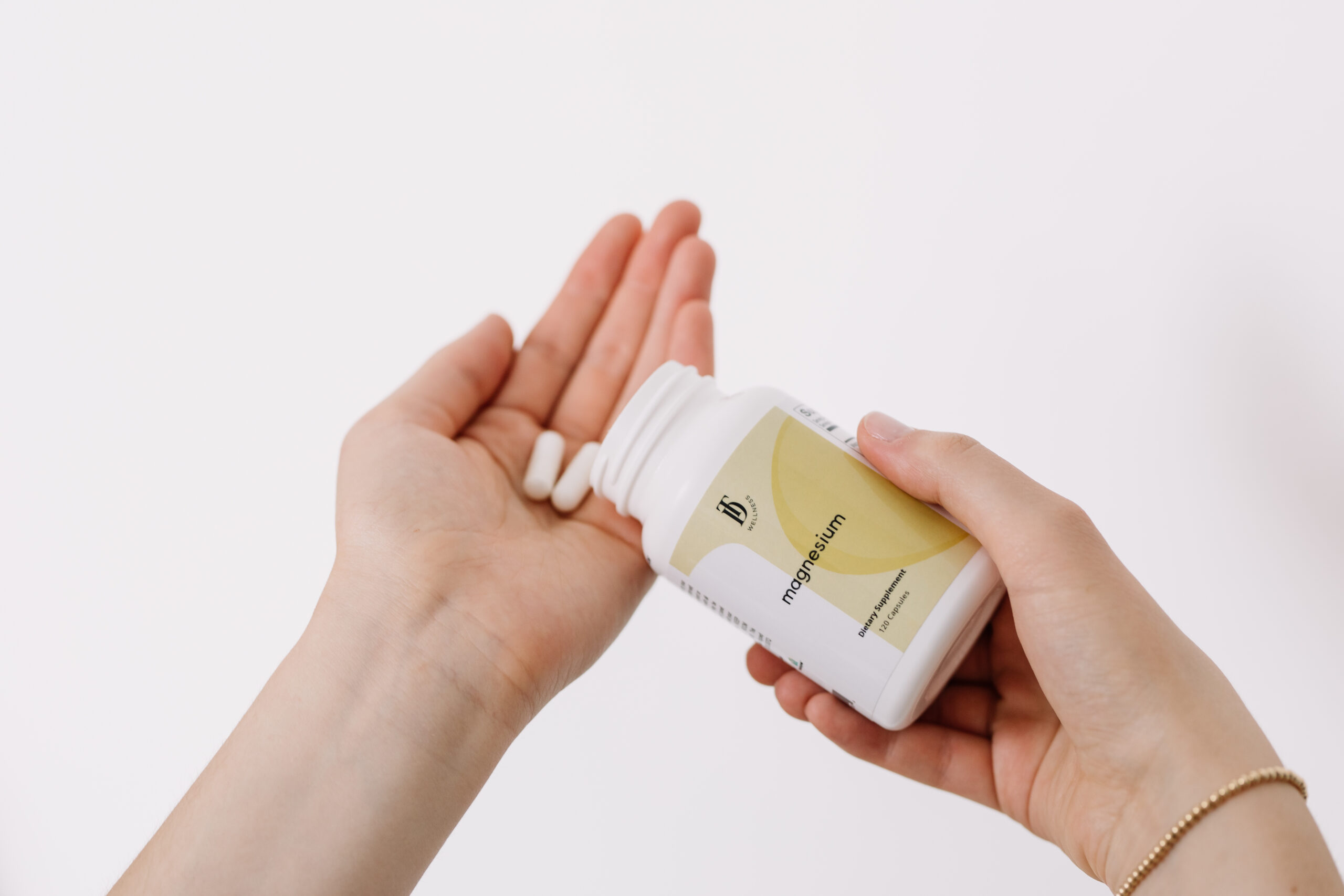How to Naturally Support Your Nervous System

In today’s fast-paced world of super-stimulation coupled with the demands of work/family/social life, it can be easy for your nervous system to suffer…and it might leave you wondering how to naturally support your nervous system. Thankfully, you can do so! Keep reading for 10 practical and attainable ways to support your body, starting with the nervous system.
But first, what is the nervous system?
The nervous system is the command system of the body. It controls nearly everything from conscious thoughts and actions to subconscious feelings and processing. The nervous system plays an integral role in almost every function of the body. Some of which include:
-
Learning and thinking
-
Emotions and feelings
-
Sleeping
-
Senses and sensory processing
-
Digestion
-
Heartbeat
-
Physical feelings and sensations
-
Coordination and balance
-
Voluntary and involuntary movements
-
Healing
-
Gathering, integrating, and interpreting information taken in through the six senses
The nervous system is composed of the brain, spinal cord, and nerve branches. The brain, spinal cord, and nerve branches are made up of billions of cells called neurons. These neurons communicate to and from each other via electrical signals. The brain is responsible for the processing and integration of information obtained by the body’s vast network of nerve branches.
The two parts of the nervous system:
The nervous system has two main parts: the Central nervous system (CNS) and the Peripheral nervous system (PNS).
The CNS is made up of the brain and spinal cord. The brain controls sensory processing and integration. It sends and receives messages regarding voluntary and involuntary thoughts, feelings, emotions, and actions. The spinal cord is the main “highway” back and forth between the brain and the nerve branches throughout the body.
The PNS is composed of the many nerves which branch out from the CNS. These nerve branches sense information from organs, muscles, glands, etc. to send it to your brain through the spinal cord. The nerve branches also receive information sent from the brain.
The PNS is further divided into the somatic nervous system, which guides voluntary movements, and the autonomic nervous system, which controls involuntary movement.
What can impair nervous system health?
-
current or past trauma
-
brain injuries
-
certain medicines
-
medical procedures and/or surgeries
-
degeneration and/or aging
-
sickness or infection
-
tumors
-
autoimmunity
-
poor diet
-
inflammation
-
lifestyle factors including lack of sleep, exercise, meaningful relationships, purpose, and joy
What are the symptoms that your nervous system needs support?
-
muscle and/or chest tightness
-
sweating
-
sensory processing difficulties (sensitivity to light, sound, etc.)
-
anxiety and/or depression
-
difficulty concentrating
-
brain fog
-
heart fluttering
-
restlessness and/or irritability
-
insomnia
-
digestive discomfort and symptoms
-
panic/anxiety attacks
-
difficulty socializing
How to naturally support the nervous system?
The great thing about naturally supporting the nervous system is you can follow these practices prophylactically to prevent nervous system fatigue/damage. They can also be done in response to nervous system symptoms that communicate the need for support.
Prevention is the best medicine. But sometimes there’s no escaping the harder seasons, moments, or circumstances in life. In these cases, it’s powerful to have the following tools on hand:
1. Deep breathing
Deep breathing activates the body’s parasympathetic, or relaxation state. This allows you to move out of the sympathetic (fight-flight-freeze) state and into a healing state where detoxification, digestion, and other important processes are prioritized by the body.
2. Sleep, naps, and rest
In the case of sleep and rest, both quality and quantity matter. Aim for 8-9 hours of quality sleep at night. Go to bed and wake up around the same time. Get morning sunlight directly to your eyes soon after waking. These small changes will help reset your circadian rhythm and improve the quality of your sleep.
While on my own healing journey after brain surgery, I can attest to the power of both naps and “putting oneself in timeout.” This is necessary for healing. Whether battling sensory overload because of being around a large crowd of people and loud noises or battling fatigue because of a busy morning being out of the house, it’s often necessary to take mini “breaks” during the day. This might mean a nap or just getting in a quiet room alone to reset and do some deep breathing. In doing so, you can reset your nervous system and bring the body down from its heightened state.
3. Digital detox
In a world saturated with technology, one of the most healing and revolutionary things you could do is take a digital detox! Whether this means choosing one day a week to go screen-free, choosing certain hours of the day to go screen-free, or just generally committing to less frequent screen usage, taking time off technology can be very healing.
Research has shown strong association between mobile phone usage and adverse mental health including anxiety, depression, and nervous system disorders. Even being in sight of your phone can heighten the nervous system’s response.
A few tips or suggestions:
-
Create a “dock” for your phone to live in the home. Leave it there unless you’re actively calling/texting someone.
-
Turn the volume and notifications off
-
No screens 1-2 hours before bed
-
Don’t bring your phone into the bedroom! Instead, go with an alarm clock – the low EMF analog alarm clocks from Tech Wellness are my favorite!
-
Wear blue light blockers if you must be on screens
4. Go low sensory
While reducing technology usage and taking “time-outs” during the day will help reduce sensory input and the possibility of nervous system overload, there are other things that can help downregulate sensory load, too!
I wear loop headphones. These aren’t just for style points, y’all . They are so helpful when I’m in public places with a lot of noise (airports, restaurants, etc.) in order to down-regulate the input to my brain.
Consider the volume and lighting at your home. Can things be shut off or turned down? Personally, I found that the sound of unloading/loading the dishwasher was difficult for me right after brain surgery. It meant I needed to communicate with family members that it was best for me to leave the room when that task was being done. It might sound silly or simple, but these small actions and ways of advocating for yourself can make a huge difference!
5. Eat real + whole foods and supplement wisely
While the discussion of nutrition can cause you to go down a rabbit hole in a lot of health circles, here’s my big takeaway for you: EAT REAL + WHOLE FOOD. Y’all, start with that. Don’t worry about superfoods or strict diets at this point. Just get rid of the junk. Eat a ton of high-quality vegetables, clean proteins, healthy fats, and some complex carbs.
You might be surprised to find your mental clarity and focus can be absolutely transformed by simplifying your diet to only real foods.
Here are some of my favorites in each category to get you going:
-
Vegetables: broccoli, brussel sprouts, kale, onions, zucchini, bell peppers, garlic
-
Fruits (carbs): berries of all kinds, kiwi, citrus fruits, tomato, pomegranate
-
Clean proteins: wild-caught fish, pastured chicken, pastured eggs
-
Healthy fats: whole/raw nuts and seeds, avocado, extra virgin olive oil, full-fat coconut milk, ghee or grass-fed butter
-
Other complex carbs: quinoa, millet, buckwheat
-
Bonus → gut-healthy fermented foods like coconut yogurt, sauerkraut, kimchi
Some of the more important supplements for nervous system health include B vitamins, Minerals (I love Quinton) and Magnesium, CBD, Gaba, L-theanine, and Omega-3’s. You can find many of these via my Fullscript dispensary. I am a big believer that supplements really do need to be tailored to the individual based on genetics, bloodwork, and bioindividual markers. I would highly suggest working with a functional medicine practitioner to find a supplement plan that works uniquely for you!
6. Cut out caffeine, alcohol, added sugars, inflammatory oils
You might be shocked to find out that not just your body, but your brain and mental health can also be drastically altered depending on what foods you regularly consume. A diet heavy in added sugars, industrialized seed and vegetable oils, and processed foods will eventually damage your brain/mind health.
Brain fog, systemic inflammation, anxiety, depression, hyperactivity, fatigue… all of these can be caused by a steady diet of poor food.
Caffeine and added sugars can cause blood sugar imbalances, which can eventually lead to hormonal imbalances. Alcohol has been shown to impair quality sleep. Hormonal imbalances, including elevated cortisol, and lack of sleep can wreak havoc on nervous system health.
Don’t be overwhelmed by the thought of cutting out foods forever. Give yourself a “trial” – start with a period of time that feels reasonable. Can you try one week of cutting the above? See how you feel! I think you’ll find it motivating once you realize how these foods impact you and how much better you feel without them!
7. Body work
Bodywork is a fantastic way to address any imbalances or overactivity of the nervous system. In general, the nervous system suffers when our bodies get “stuck” in the sympathetic (fight-flight-freeze) state.
Bodywork, such as cranial sacral therapy (CST), chiropractic care, acupuncture, and massage, can highly influence the physical and chemical activity of the peripheral and central nervous systems.
This type of approach to nervous system care can actually activate the parasympathetic (relax, digest, and heal) state within the body. Bodywork can down-regulate overactivity while restoring balance and stability.
Vagal stimulation, which can be done within the scope of any of the bodywork modalities mentioned above, is also considered an effective therapy to combat nervous system problems. The vagus nerve, or cranial nerve 10, runs from the brain to the gut and branches to countless places along the way. Vagal nerve stimulation can be an especially good approach when nervous system problems coincide with digestive disorders.
8. Gentle movement
Movement and exercise are fabulous for the nervous system…as long as you’re not overdoing it!
Research tells us that movement can cause the release of beneficial neurotransmitters, including dopamine, serotonin, norepinephrine, and acetylcholine in the central nervous system.
In particular, exercises that focus on tension release as well as those that focus on breathing are fantastic for nervous system health. Some of my favorite ways to exercise for improved nervous system regulation include yoga, walking, pilates, and stretching.
9. Meditation, prayer, and gratitude
This has been everything for me. If you’ve been following my journey through brain surgery and the ensuing recovery, then you know I’ve been all-in on nervous system rehabilitation. And I couldn’t do it without prayer, journaling, gratitude, and meditation.
Studies have shown time and again that prayer and meditation are beneficial to the brain. They promote the parasympathetic state and decrease negative emotional activity. One study even showed that prayer can stimulate serotonin and dopamine production, resulting in an increased sense of stability and elevated mood.
For me, prayer has been incredibly grounding during moments that have been particularly difficult to process or in times when I’ve felt overstimulated and scattered.
10. Get outside
A 2019 study found that people who spent two hours a week in nature saw improvement in health and psychological well-being as compared to those who didn’t. The benefits of grounding (being outside, barefoot on the earth) are well-documented, including its ability to downregulate inflammation.
Sunshine is not only powerful for setting circadian rhythm and improving sleep, but also for Vitamin D production. Research even shows that exposure to natural sunlight can improve cognitive function.
In addition to the above, outdoor air has been shown to be generally far superior in quality to indoor air. It contains less toxins and chemicals.
Between the benefits of sunlight, the healing effects of nature, and the decreased toxicity of outdoor air, getting outside is crucial for nervous system healing and regulation.
I hope you find these ten methods helpful for naturally protecting, improving, and healing the nervous system. Above all, I want to encourage you that nervous system healing is a marathon and not a sprint. It can feel like two steps forward, and one step back. That’s okay! Stay at it. Be consistent. Be gentle with yourself on your “off” days or when you didn’t do a great job of fitting in all the therapies and rehab practices.
I’m cheering you on.
Finally, I want to leave you with some helpful resources for nervous system healing:
– Primal Trust Membership: Brain Retraining + Nervous System Healing + True Self Discovery. An online membership platform with Cathleen King, DPT. Use code TAYLORDUKES for 10% off the first month’s membership
–Higherdose PEMF mat (use code Taylor15)
–JOOVV red light (use code TAYLORDUKES)
–LumeBox Pro (use code DUKESWELLNESS)
–Magnesium Baths
–Taylor Dukes Wellness Ultimate Detox Bath
–Infrared Sauna (use code TAYLORDUKES)
Stay Updated With Exciting News at Taylor Dukes Wellness!
We are always working on new ways to serve you on your health journey. Be the first to know about new offerings, health articles, and more by clicking here and filling out your information so we can be in touch.
Share This Post:
Your Wellness Deep Dive
- Be the first to learn about new healthy living resources, blog posts, and exclusive TDW offerings by getting on my insider list.
- Find healthy living products with ingredients you can trust – the same ones I personally use for myself and my family – in the TDW Shop. Check out our protein powders, electrolytes, supplements, and more!
- Get personalized support through the TDW Community. When you become a member, you get access to functional medicine expertise from me and my team, functional medicine lab testing and 1:1 consults, a digital library of exclusive wellness content, live monthly Q&As with me, and so much more!
YOU MAY ALSO LIKE:
Helping you get your gut right, improve energy, boost immunity, balance hormones, sleep better and look + feel your best
DISCLAIMER
PRIVACY POLICY
TERMS + CONDITIONS
ACCESSIBILITY
© 2025 Taylor Dukes Wellness
LEARN
SHOP
ABOUT
TDW Community
Free Guides
Blog
TDW Store
Fullscript
About Taylor
Press
Contact
COOKIE POLICY
SITE CREDIT
Trusted Products



